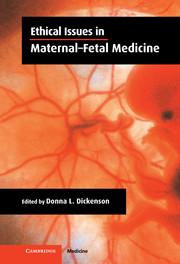Book contents
- Frontmatter
- Contents
- List of contributors
- Acknowledgements
- 1 Introduction: recent debates in maternal–fetal medicine – what are the ethical questions?
- 2 Overview: a framework for reproductive ethics
- I GENERIC ISSUES IN PREGNANCY
- 3 Multicultural issues in maternal–fetal medicine
- 4 HIV in pregnancy: ethical issues in screening and therapeutic research
- 5 Genetic screening: should parents seek to perfect their children genetically?
- 6 Is there a duty not to reproduce?
- 7 Between fathers and fetuses: the social construction of male reproduction and the politics of fetal harm
- 8 Restricting the freedom of pregnant women
- II INCEPTION OF PREGNANCY: NEW REPRODUCTIVE TECHNOLOGIES
- III FIRST AND SECOND TRIMESTER
- IV THIRD TRIMESTER
- V NEONATAL LIFE
- Index
8 - Restricting the freedom of pregnant women
from I - GENERIC ISSUES IN PREGNANCY
Published online by Cambridge University Press: 29 September 2009
- Frontmatter
- Contents
- List of contributors
- Acknowledgements
- 1 Introduction: recent debates in maternal–fetal medicine – what are the ethical questions?
- 2 Overview: a framework for reproductive ethics
- I GENERIC ISSUES IN PREGNANCY
- 3 Multicultural issues in maternal–fetal medicine
- 4 HIV in pregnancy: ethical issues in screening and therapeutic research
- 5 Genetic screening: should parents seek to perfect their children genetically?
- 6 Is there a duty not to reproduce?
- 7 Between fathers and fetuses: the social construction of male reproduction and the politics of fetal harm
- 8 Restricting the freedom of pregnant women
- II INCEPTION OF PREGNANCY: NEW REPRODUCTIVE TECHNOLOGIES
- III FIRST AND SECOND TRIMESTER
- IV THIRD TRIMESTER
- V NEONATAL LIFE
- Index
Summary
Introduction
In an aggressive response to the dangers of drug-taking in pregnancy, women have been jailed during pregnancy for taking illicit drugs and immediately following delivery if newborn drug tests prove positive (Paltrow, 1990; Berger, 1991). Court judgments have claimed that ‘a child has a legal right to begin life with a sound mind and body’ (Smith v Brennan, 1960). The argument appears to be that pregnant drug addicts should stop, as it is wrong to harm fetuses (who will become babies who have a right to be born of sound mind and body). If mothers do not stop, other actions are justified on this view – even those involving force or coercion (Logli, 1990; Nolan, 1990).
However, there are many ways in which mothers put fetuses at risk, apart from taking illegal drugs (such as heroin or cocaine). Examples include taking legal drugs (such as alcohol or cigarettes), failing to attend for antenatal care, inhaling environmental pollutants or even skiing. Actions against pregnant drug takers are taking place within a wider programme of legal enforcement of women's ethical obligations to their fetuses (Kolder et al, 1987; Nelson and Milliken, 1989; Re S, 1992).
This chapter examines moral arguments used to justify society acting against pregnant women on behalf of their unborn children. I have used the drug-taker as a ‘hard case’ and constructed a framework to examine any action against pregnant women (see Figure 8.1).
- Type
- Chapter
- Information
- Ethical Issues in Maternal-Fetal Medicine , pp. 131 - 146Publisher: Cambridge University PressPrint publication year: 2002
- 3
- Cited by



